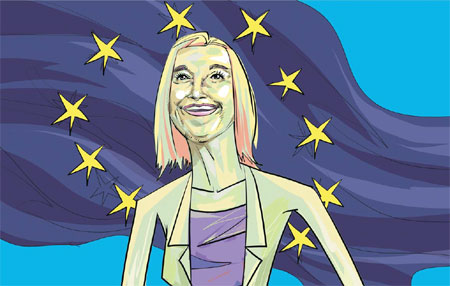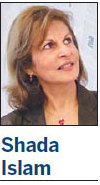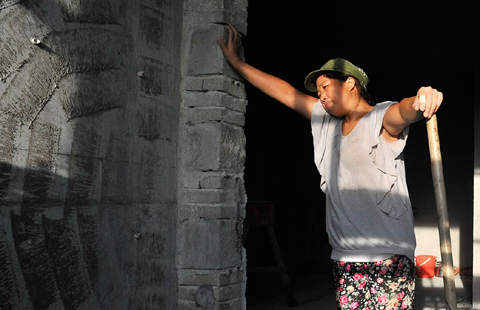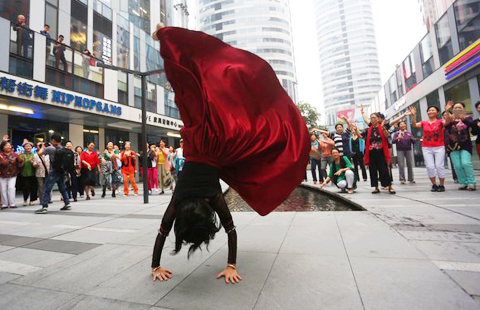European Union's credibility is at risk
Updated: 2014-09-26 08:39
By Shada Islam(China Daily Europe)
|
|||||||||||


To avoid losing more global influence, EU needs to reassess security, reset its aims and define a new agenda
Federica Mogherini's appointment as the new European Union foreign policy chief offers an opportunity for an overhaul of EU foreign and security policy.
With many EU leaders, ministers and senior officials slow to respond to world events given Europe's traditionally long summer break, the 2014 summer of death and violence has left the reputation of "global Europe" in tatters, highlighting the EU's apparent disconnect from the bleak reality surrounding it.
When she takes charge in November along with other members of the new European Commission, led by Jean-Claude Juncker, Mogherini's first priority must be to restore Europe's credibility in an increasingly volatile and chaotic world.
It cannot be business as usual. A strategic rethink of Europe's global outreach is urgent. Europe can no longer pretend that it is not - or is only mildly - shaken by events on its doorstep. In a world where many countries are wracked by war, terrorism and extremism, EU foreign policy cannot afford to be ad hoc, reactive and haphazard. Given their different national interests and histories, European governments are unlikely to ever speak with one voice on foreign policy. But they can and should strive to share a coherent, common, strategic reflection and vision of Europe's future in an uncertain and anxious world.
Changing gears is going to be tough. Many of Europe's key beliefs - in the use of soft power, a reliance on effective multilateralism, the rule of law and a liberal world order - are being shredded by governments and nonstate actors alike. With China and other emerging nations, especially in Asia, gaining increased economic and political clout, Europe has been losing global power and influence for almost a decade.
Despite pleas by NATO and the crisis in Ukraine, most European governments remain reluctant to increase military and defense spending. At the same time, the eurozone crisis and Europe's plodding economic recovery with unacceptably high unemployment continue to erode public support for the EU both at home and abroad. Populist far-right and extreme-left groups in Europe - including in the European Parliament - preach a protectionist and inward-looking agenda. Most significantly, EU national governments are becoming ever greedier in seeking to renationalize important chunks of what is still called Europe's "common foreign and security policy".
To prove her critics wrong - and demonstrate foreign policy expertise and flair despite only a six-month stint as Italy's foreign minister - Mogherini will have to hit the ground running. Her performance in the European Parliament on Sept 2, including an adamant rejection of charges of being "pro-Russian", appears to have been impressive. Admirers point out that she is a hard-working team player who reads her briefs carefully and speaks fluent English and French in addition to her native Italian. These qualities should stand her in good stead as she manages the unwieldy European External Action Service, plays the role of vice-president of the European Commission, chairs EU foreign ministerial meetings, chats with foreign counterparts and travels around the world while also - hopefully - spearheading a strategic review of Europe's global interests and priorities.
The tasks ahead are certainly daunting. There is need for reflection and action on several fronts - all at the same time. Eleven years after the then EU high representative Javier Solana drew up the much-lauded European Security Strategy (partially revised in 2008), Europe needs to reassess the regional and global security environment, reset its aims and ambitions and define a new agenda for action. But this much-needed policy overhaul to tackle new and evolving challenges must go hand-in-hand with quick firefighting measures to deal with immediate regional and global flashpoints.
The world in 2014 is complex and complicated, multipolar, disorderly and unpredictable. Russia's actions in Ukraine have upended the post-World War II security order in Europe. The so-called Islamic State is spreading its hateful ideology through murder and assassination in Syria and Iraq, not too far from Europe's borders. A fragile Middle East truce is no guarantee of real peace between Israelis and Palestinians. Relations with China have to be reinforced and consolidated. These and other complex problems require multifaceted responses.
The days of one-size-fits-all foreign policy are well and truly over. In an interconnected and interdependent world, foreign policy means working with friends but also with enemies, with like-minded nations and those non-like-minded, with competitors and allies. It is imperative to pay special attention to China, India and other headline-grabbing big countries, but it could be self-defeating to ignore the significance and clout of Indonesia, Mexico and other middle or even small powers. Upgrading ties with the United States remains crucial. While relations with states and governments are important, they must go hand-in-hand with contacts with business leaders, civil society actors and young people. Finally, Europe needs to acquire a less simplistic and more sophisticated understanding of Islam and its Muslim neighbors, including Turkey, which has been left in uncertainty about EU membership for more than 50 years.
Europe's response to the new world must include a smart mix of brain and brawn, soft and hard power, carrots and sticks. Isolation and sanctions cannot work on their own but neither can a foreign policy based only on feel-good incentives. The EU's existing foreign policy tools need to be sharpened but European policymakers also need to sharpen and update their views of the world.
Mogherini's youth and hopefully fresh stance on some of these issues could be an asset in this exercise. Importantly, Mogherini must work in close cooperation and consultation with other EU institutions, including their work on the European Parliament and especially the European Commission, whose many departments, including enlargement issues, trade, humanitarian affairs, environment, energy and development are crucial components of global Europe. The failure of synergies among European Commission departments is believed to be at least partly responsible for the weaknesses of the EU's "neighborhood policy".
Also, a coherent EU foreign policy demands close coordination with EU capitals. This is especially true in relations with China. Recent experience shows that, as in the case of negotiations with Iran, the EU is most effective when the foreign policy chief works in tandem with EU member states. Closer contacts with NATO will also be vital if Europe is to forge a credible strategy vis-a-vis Russia and Ukraine. Such cooperation is especially important if - as this article suggests - Mogherini embarks on a revamp of EU foreign and security policy.
Mogherini will be unable to do it on her own. Much will depend on the European External Action Service team she works with and the knowledge, expertise and passion her aides bring to their work. Teamwork and leadership, not micromanagement, will be required.
Putting pressing global issues on the backburner is no longer an option. The change of guard in Brussels is the right moment to review and reconsider Europe's role in the world. Global Europe's disconnect needs to be tackled before it is too late.
The author is director of Policy of Friends of Europe, a think-tank in Brussels. The views do not necessarily reflect those of China Daily.
(China Daily European Weekly 09/26/2014 page10)
Today's Top News
UK to join airstrikes against IS in Iraq
Qatar forfeit basketball game
Russia turns to RMB to thwart Western sanctions
Express delivery sector opens up
China rebuffs EU on condemning life sentence
Emissions report tells only part of story, expert says
India triumphs in Mars mission
iPhone smugglers targeted
Hot Topics
Lunar probe , China growth forecasts, Emission rules get tougher, China seen through 'colored lens', International board,
Editor's Picks

|

|

|

|

|

|





